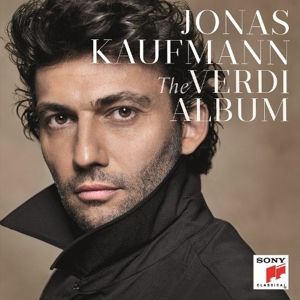|
|
|
|
|
|
|
|
|
Varsity, 25th September 2013 |
| by Declan Kennedy |
|
|
|
Declan Kennedy finds this album to be both technically impressive and widely
appealing |
|
|
|
The Verdi Album, Jonas Kaufmann |
|
 After
listening to his latest CD, it may be difficult to understand why Jonas
Kaufmann lost out to trumpeter Alison Balsom in the running for Gramophone’s
Artist of the Year. With anniversary recordings commandeering music-making
of all kinds in 2013, not least releases of Britten and Wagner, it’s hardly
surprising that Sony have jumped on the bandwagon with Kaufmann to celebrate
the bicentenary of Verdi’s birth. We should be anything but cynical,
however, as his selections from Il Trovatore, Simon Boccanegra and Otello
among others showcase Kaufmann’s undoubted mastery of the Verdi repertoire. After
listening to his latest CD, it may be difficult to understand why Jonas
Kaufmann lost out to trumpeter Alison Balsom in the running for Gramophone’s
Artist of the Year. With anniversary recordings commandeering music-making
of all kinds in 2013, not least releases of Britten and Wagner, it’s hardly
surprising that Sony have jumped on the bandwagon with Kaufmann to celebrate
the bicentenary of Verdi’s birth. We should be anything but cynical,
however, as his selections from Il Trovatore, Simon Boccanegra and Otello
among others showcase Kaufmann’s undoubted mastery of the Verdi repertoire.
The album has fingerprints of Classic FM all over it: from the grandiose
title and headshot album cover to the fact that there’s nothing on here
exceeding the unimaginable length of ten minutes. My expectations were
lowered still further when Kaufmann opened affairs with ‘La donna é mobile’
from Rigoletto. I was pleasantly surprised, then, as I quickly realised that
Sony’s best-seller orientated marketing shouldn’t distract from the fact
that this is an album for both the connoisseur and those who simply want to
listen to a world-class tenor singing world-class arias.
Kaufmann
seems to be in his comfort zone singing the music of a composer he describes
as “musically synonymous with Italy”. Throughout the album Kaufmann
demonstrates a vocal flexibility that more than justifies his reputation as
one of the world’s leading tenors. The German’s technical capability is one
of the highlights of the album as every nuance thrown at him by Verdi’s
score is flawlessly executed – not least the ending of ‘Se quell guerrier io
fossi! … Celeste Aida’ from Act I of Aida, as Kaufmann sings a top B-flat at
a tender piano before a diminuendo which he somehow manages to sustain for
much of the orchestral coda. While this may be the sweetest moment of the
album, the more indulgent of us will just as much enjoy Kaufmann’s top C at
the end of ‘Di quella pira’ from Il Trovatore, which he holds for a length
which would give sufficient time for the audience of any opera house in the
world to rise to their feet.
The Orchestra dell’Opera di Parma is
second-rate at best and issues with ensemble appear all too often. The
string sound is dull, limp and unsettled and Kaufmann is left to rescue the
situation by ensuring he is the centre of attention at all times. That said,
an honourable mention must go to the clarinet featured in ‘La vita è inferno
all’infelice … O tu, che in seno agli angeli’ from La Forza del Destino; its
lyrical playing compliments Kaufmann beautifully.
Any danger of this
being merely an album of Verdi show-stoppers for easy listening is
completely dispelled by the time we reach the last two tracks. The album is
brought to a close with its best bit: two excerpts from Otello. Kaufmann
leaves us with an intimation of what is to come; he has made little effort
to hide his desire to sing Otello and while it may be a few years before it
happens, it sounds as if it will not be a disappointment.
|
|
|
|
|
|
|
|
|
|
|
|
|
|
|
|
|
|
|